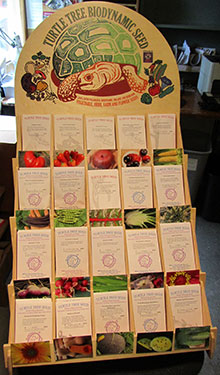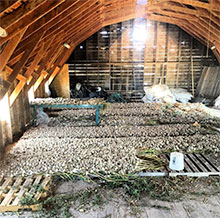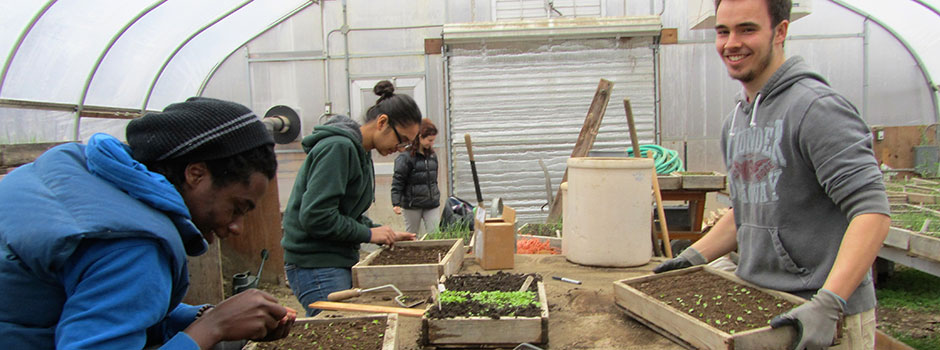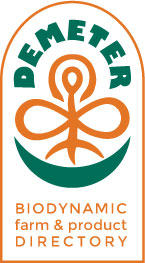“Healing people and the planet through agriculture”
Profiles in Farming
Start into Spring: It's time to plant.
Now that we're past the vernal equinox and the thaw of winter has begun, the only appropriate place to turn one's attention is to garden plans for the summer. Sure the melting snow may have revealed some unfinished projects in colder climes across the country, and the beds need a lot of attention, but there's nothing more gratifying than enjoying one's own homegrown food in a few months; it's time to get work. Days are longer and warmer. Some places though there's only a sixty-day growing season which means finding the right seed for your garden is a priority task.
The Biodynamic seed growing community is a small vigorous group of dedicated believers in purity, taste, storage, and variety. Open-pollinated seeds are plant varieties that have stable traits from one generation to the next. Demeter currently has three certified open pollinated seed growers, Sero Seed Company, Turtle Tree Cooperative and Meadowlark Hearth. Each operation strives to find varieties that satisfy home gardeners and market gardens.
Open pollinated varieties are usually grown in fields where they self and cross-pollinate. Wind and insects carry the pollen from one plant to another. Plants that cross-pollinate must be isolated from other plants of different varieties so they will produce seed that is "true to type."
In the late seventies, as organic was murmured in the marketplace, a few farmers caught wind of what Biodynamic seed growers were stewarding abroad—and it was not just for the Steiner believer but the eater as well. Varieties were harvested that tasted better, performed better and stored better.
4th generation farmer Beth Everett, founder of Meadowlark Hearth and Turtle Tree Seed Initiative, shares an extensive background in Biodynamic agriculture, Camphill communities and Waldorf education with her husband, Nathan Corymb. The pair met at Kimberton Hills and soon found themselves in Switzerland, where they become parents and fully immersed themselves in seed growing. Nathan studied at Sativain Switzerland and Bingenheim in Germany. In 1991 the couple returned to Minnesota where they started Turtle Tree Seed Initiative. They gifted Turtle Tree to Camphill Village and combined it with social therapeutic work for special needs adults. They left New York when they inherited Beth's family farm in Nebraska and started Meadowlark Hearth.
Today the Camphill Village in New York has six workshops, about 230 residents, including Turtle Tree. There are now 365 varieties in the catalog. According to Turtle Tree farm manager Ian Robb, "We take a feeling of responsibility for all the varieties. Â We have another 50 varieties in seed storage, where we're stewarding the future of seed. I get a lot of personal enjoyment when a group or individual asks us to be the custodian of a seed that they no longer can grow out." Ian's history in BD farming is lifelong, "Camphill started in Scotland near Aberdeen, where I was born. I joined the village in 1973 as a gardening apprentice. My background started with Biodynamics and has now come full circle back to Biodynamics. I broke away for a bit, to attend Emerson and then in 1986 to help to start Brookfield Farm. I have been one of the dairy farmers but I have also been a vegetable grower for most of my life, and have always wanted to know everything in agriculture. It wasn't until 2001 that I became a seed grower. And I always like flipping through the seed catalogs."
Tom Johns, founder of Sero Seeds, sees the transition to Biodynamic practices as a natural step for anyone who has grown up organic farming, "It's more sustainable and self-reliant. Really though, we're growing soil first, fostering the living microbes growing nitrogen and in turn, well-balanced soil will produce a well-balanced plant."
Turtle Tree, along with Meadowlark Hearth and Sero Seed Company, rely on collaboration in their small seed community for a few reasons. First, not all varieties can be grown just anywhere. Climate and geography impact what can be grown out and grown for seed. There are certified growers contributing to the Co-op and the other grow operations. A person could be in California or Colorado who is contributing to the seed inventory. Traceability for seeds is not just about certifications but about the growing zone. Information about the growing season and elevation or the history of the variety enable a consumer to make the best choices for best paste tomato, storage onion, storage carrot, eggplant or basil type. It's the best choice because these three Demeter certified seed providers are working with trial crops regularly, actively trying to find plant varieties that grow, store, and process well. And all within the rhythms of a natural growing cycle.
Lisa Millette, who heads up the seed garden and seed cleaning crew at Turtle Tree explains why having other growers is so important, "Growing in New England, we're limited to certain varieties. There are some gardeners who have warm season crops. Carrots are a wonderful example. We're still trying to nail down the best way to grow carrot seed on our property because of the prevalence of Wild Carrot and Queen Anne's Lace. In our catalog, we exhibit as much information about the growers, and will it work for the consumer."
As Sero Seed Company is in Oregon, Turtle Tree in New York and Meadowlark Hearth in Nebraska, there are definitely distinct offerings from each of the gardens. We asked each operation what their banner plant variety was, and of course each had a very different answer.
Meadowlark Hearth is very proud of their brassicas in general. According to Beth, brassica tastes are not as popular as tomato tastes and so the varieties are not maintained to give the consumer or eater a good choice. "We like to grow biennials, and that's an intricate process in Nebraska so we follow a healthy cycle to include storage. The top picks include carrots, onions, cabbage, early Milan carrot, the le Blanca cooking carrot, the Monarch variety of celeriac and European varieties of amaranth.
Turtle Tree admits there is a mascot so to speak in their catalog offerings, the Clear Dawn Onion which Beth and Ian actually brought to the USA from a friend who had saved the seed. The Turtle Tree crew giggles about the Clear Dawn because its reliability is a staple for so many, and for Camphill Village. The Shweitzer snow pea tops the list too. It's a fantastic heirloom variety for its blooms, seeds and fruit. One of the farm managers quipped "you don't need to skip onto the sugar snap if you're growing the Shweitzer."
Sero Seed Company has a great 75-80 day Heirloom Sweet Corn called Hooker's Sweet Indian. This 5-7 inch long white corn that can be enjoyed fresh or dried to show off a blue black cob of kernels. It's ideal for baking and autumn decorations. Sero also has two varieties of kohlrabi, the Delicacy White and the Azur Star. And their Green Deer Tongue loose leaf lettuce is an 1840 Heirloom variety prized for its sweet, juicy and triangular shaped leaves. Because Oregon is dry in the summer months, it's an ideal region for growing a diverse library of lettuces. Townsend Broccoli is known for its powerful comeback of side shoots once the main head has been harvested. Tom, though, is most proud that their BD offerings have rounded out to give a gardener a strong selection of plants. "When we first started there wasn't much to offer."
All three companies have online shopping carts and are available in various stores around their regions. Demeter is excited to announce the availability of Sero Seed throughout the Pacific Northwest in Whole Foods Markets.

"...there's nothing more gratifying than enjoying one's own homegrown food in a few months; it's time to get work."


